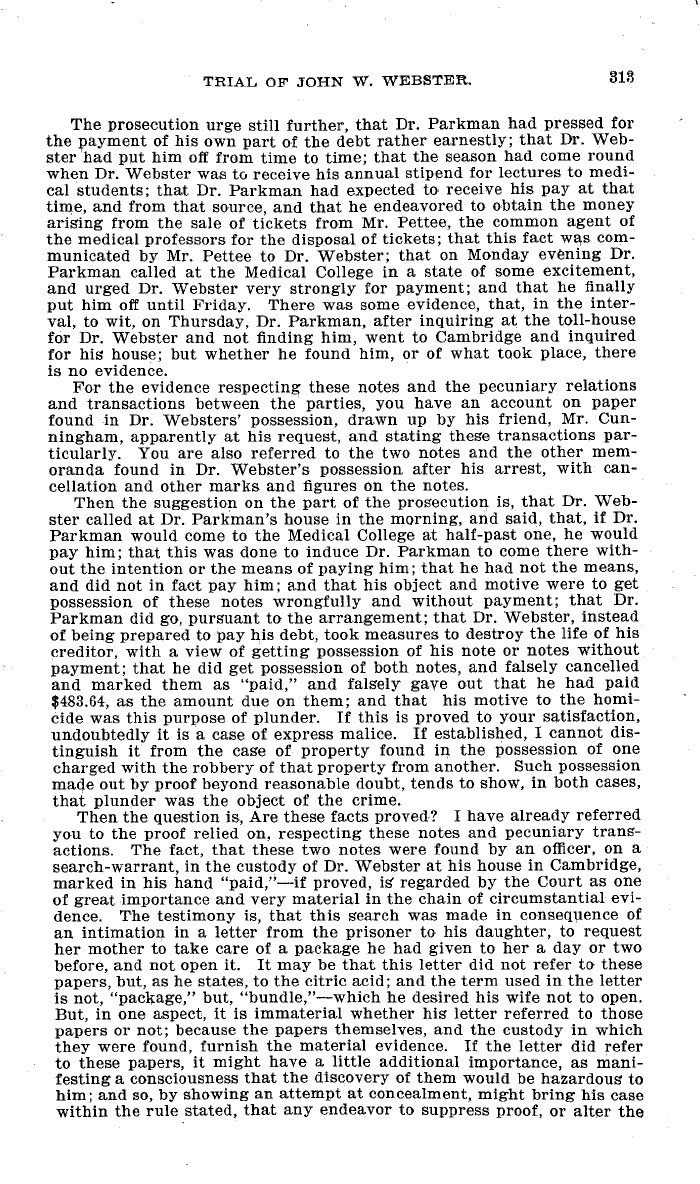|
TRIAL OF JOHN W. WEBSTER. 313
The prosecution urge still further, that Dr. Parkman had pressed for
the payment of his own part of the debt rather earnestly; that Dr. Web-
ster had put him off from time to time; that the season had come round
when Dr. Webster was to receive his annual stipend for lectures to medi-
cal students; that Dr. Parkman had expected to receive his pay at that
time, and from that source, and that he endeavored to obtain the money
arising from the sale of tickets from Mr. Pettee, the common agent of
the medical professors for the disposal of tickets; that this fact was com-
municated by Mr. Pettee to Dr. Webster; that on Monday evening Dr.
Parkman called at the Medical College in a state of some excitement,
and urged Dr. Webster very strongly for payment; and that he finally
put him off until Friday. There was some evidence, that, in the inter-
val, to wit, on Thursday, Dr. Parkman, after inquiring at the toll-house
for Dr. Webster and not finding him, went to Cambridge and inquired
for his house; but whether he found him, or of what took place, there
is no evidence.
For the evidence respecting these notes and the pecuniary relations
and transactions between the parties, you have an account on paper
found in Dr. Websters' possession, drawn up by his friend, Mr. Cun-
ningham, apparently at his request, and stating these transactions par-
ticularly. You are also referred to the two notes and the other mem-
oranda found in Dr. Webster's possession after his arrest, with can-
cellation and other marks and figures on the notes.
Then the suggestion on the part of the prosecution is, that Dr. Web-
ster called at Dr. Parkman's house in the morning, and said, that, if Dr.
Parkman would come to the Medical College at half-past one, he would
pay him; that this was done to induce Dr. Parkman to come there with-
out the intention or the means of paying him; that he had not the means,
and did not in fact pay him; and that his object and motive were to get
possession of these notes wrongfully and without payment; that Dr.
Parkman did go, pursuant to the arrangement; that Dr. Webster, instead
of being prepared to pay his debt, took measures to destroy the life of his
creditor, with a view of getting possession of his note or notes without
payment; that he did get possession of both notes, and falsely cancelled
and marked them as "paid," and falsely gave out that he had paid
$483.64, as the amount due on them; and that his motive to the homi-
cide was this purpose of plunder. If this is proved to your satisfaction,
undoubtedly it is a case of express malice. If established, I cannot dis-
tinguish it from the case of property found in the possession of one
charged with the robbery of that property from another. Such possession
made out by proof beyond reasonable doubt, tends to show, in both cases,
that plunder was the object of the crime.
Then the question is, Are these facts proved? I have already referred
you to the proof relied on, respecting these notes and pecuniary trans-
actions. The fact, that these two notes were found by an officer, on a
search-warrant, in the custody of Dr. Webster at his house in Cambridge,
marked in his hand "paid,"-if proved, isr regarded by the Court as one
of great importance and very material in the chain of circumstantial evi-
dence. The testimony is, that this search was made in consequence of
an intimation in a letter from the prisoner to his daughter, to request
her mother to take care of a package he had given to her a day or two
before, and not open it. It may be that this letter did not refer to these
papers, but, as he states, to the citric acid; and the term used in the
letter
is not, "package," but, "bundle,"-which he desired his wife not to open.
But, in one aspect, it is immaterial whether his letter referred to those
papers or not; because the papers themselves, and the custody in which
they were found, furnish the material evidence. If the letter did refer
to these papers, it might have a little additional importance, as mani-
festing a consciousness that the discovery of them would be hazardous to
him; and so, by showing an attempt at concealment, might bring his case
within the rule stated, that any endeavor to suppress proof, or alter the
|

